Papers by Dorothée Goetze
Historisches Jahrbuch, 2020
Historisches Jahrbuch , 2020
Handbuch Frieden im Europa der Frühen Neuzeit, hrsg. von Irene Dingel, Michael Rohrschneider, Inken Schmidt-Voges, Siegrid Westphal, Joachim Whaley, 2020
Machtmensch – Familienmensch. Kurfürst Friedrich Wilhelm von Brandenburg (1620–1688). Hrsg. von Michael Kaiser, Jürgen Luh, Michael Rohrschneider, 2020

h-soz-kult, 2019
Obwohl der Westfälische Frieden zu den am dichtesten beschriebenen historischen Momenten der mode... more Obwohl der Westfälische Frieden zu den am dichtesten beschriebenen historischen Momenten der modernen Historiographie gehört und ein zentrales Ereignis für die Internationalen Beziehungen der Frühen Neuzeit darstellt, ist der Westfälische Friedenskongress in seiner Eigenlogik als erster europäischer Gesandtenkongress weit weniger gut erforscht. Der Forschungsbericht zeichnet die zentralen Forschungsentwicklungen nach und hebt dabei aktuelle Ansätze und Desiderate hervor. Die Autorinnen zeigen, dass die bis heute im Vergleich zu den Friedensverträgen geringe Forschung zum Westfälischen Friedenskongress als diplomatisches Ereignis vor allem aus seiner Stellung an der Schnittstelle zwischen Historischer Friedensforschung und Neuer Diplomatiegeschichte resultiert. Die aus der Hofforschung kommende Neue Diplomatiegeschichte hat den Eigenheiten der Kongressdiplomatie bislang nur selten Aufmerksamkeit geschenkt. Zudem weisen die Autorinnen auf das Potenzial einer diplomatiegeschichtlich fundierten Forschung zum Westfälischen Friedenskongress für die Historische Friedensforschung hin. Nur so können die Schwierigkeiten des Friedenschließens adäquat herausgearbeitet werden.
Abstract
The Peace of Westphalia is extensively described in modern historiography and regarded as a central event in the history of early modern international relations. However, the inherent logic of the preceding peace congress as the first international and multilateral delegated peace congress is much less explored. This research report delineates the main research developments and highlights current approaches as well as desiderata. Thereby the authors show that the lack of research on the peace congress as a diplomatic event results from its position between Historical Peace Research and New Diplomatic History. Originating from court research, New Diplomatic History has so far not paid much attention to the specifics of congress diplomacy. Accordingly, the authors stress the potential that lies in analysing the Westphalian Peace Congress from such a cultural historical perspective for Historical Peace Research, which is the only way allowing us to explore the difficulties of peacemaking in a profound and comprehensive manner.
in: Friedensordnung und machtpolitische Rivalitäten. Die schwedischen Besitzungen in Niedersachsen im europäischen Kontext zwischen 1648 und 1721, [Veröffentlichungen des Niedersächsischen Landesarchivs, 3] Münster , 2019
Dorothée Goetze/Lena Oetzel (Hg.): Warum Friedenschließen so schwer ist: Frühneuzeitliche Friedensfindung am Beispiel des Westfälischen Friedenskongresses. (Schriftenreihe zur Neueren Geschichte, N. F., 2) Münster 2019
Dorothée Goetze/Lena Oetzel (Hg.): Warum Friedenschließen so schwer ist: Frühneuzeitliche Friedensfindung am Beispiel des Westfälischen Friedenskongresses. (Schriftenreihe zur Neueren Geschichte, N. F., 2) Münster 2019., 2019

Journal of early modern history, 2019
This special issue has been motivated by the drive to contextualize the role of individuals of va... more This special issue has been motivated by the drive to contextualize the role of individuals of various backgrounds in early modern foreign relations. All contributions cover a broad geographic scope and stress the impact of non-European practices and stages for the study of early modern foreign relations. Four thematic articles follow diverse diplomatic actors, ranging from non-elite envoys to chartered companies, Catholic friars and ministers on ships, to foreign courts, and behind their desks. They provide insights into these individual actors' functions and achievements and raise questions about social belonging and knowledge channels. The introduction below portrays the development of an actor-oriented research angle in the field of New Diplomatic History over the past decades and addresses blurring concepts and over-generalizations. It attempts to redefine the heterogeneous group of early modern diplomatic actors as products of their involvement in political and material struggles, both at home and abroad.
Denmark and Estonia (1219–2019). Selected studies on common relations. Hrsg. von Jens E. Olesen. (Geschichte der Ostseeregion, 1), 2019
Geschichte in Wissenschaft und Unterricht, 2019
Jahrbuch für Regionalgeschichte , 2018
Study on the representation of traffic routes in early modern travel accounts
Defizitäre Souveräne. Herrschaftslegitimation im Konflikt. Hrsg. von Lena Oetzel und Kerstin Weiand. [Normative Orders 23], 2018
Landgraf Carl (1654-1730). Fürstliches Planen und Handeln zwischen Innovation und Tradition. Hrsg. von Holger Th. Gräf, Christoph Kampmann, Bernd Küster. (Veröffentlichungen der Historischen Kommission für Hessen 87), 2017
Der Tagungsblog zu "Warum Friedenschließen so schwer ist: Der Westfälische Friedenskongress in in... more Der Tagungsblog zu "Warum Friedenschließen so schwer ist: Der Westfälische Friedenskongress in interdisziplinärer Perspektive". Auf "Rheinische Geschichte. wissenschaftlich bloggen" finden Sie bereits im Vorfeld der Tagung (31.8.-1.9.2017, Rheinische Friedrich-Wilhelms-Universität Bonn) alles Wissenswerte zu Programm und Teilnehmern.
Anpassung, Unterordnung, Widerstand?! Das Verhältnis zwischen Ur- und Neuadel im schwedischen Konglomeratstaat (Schriftenreihe der David-Mevius-Gesellschaft 11), Hamburg 2017, 161-197.
Friedensordnungen in geschichtswissenschaftlicher und geschichtsdidaktischer Perspektive [Wissenschaft und Lehrerbildung 2], Göttingen 2017, S. 243-258.
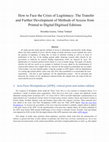
Proceedings of the Third Conference on Digital Humanities in Luxembourg with a Special Focus on Reading Historical Sources in the Digital Age., 2016
All media provide media specific methods of access to information and therefore media change affe... more All media provide media specific methods of access to information and therefore media change affects also these methods of access. But the change of media and hence access methods also raises the question of legitimacy of doing this, in terms of scholarly working as well as in terms of justification in the face of the funding general public financing research either directly by the government or indirectly by research funding organisations which are financed by taxes. The digitalization of a formerly printed critical edition is a case of media change. This paper will shortly describe the full text search as an example of methods of access added by the transformation of classical print editions into a digital Web site, and how far this method accommodates the user habits of the broader, even non-scholarly public. Using the example of APW digital, a full text digitalization of a cutting edge printed edition, online since July 2014, three possibilities to accommodate the users' expectations -and thus to gain legitimacy for the digitalization project -will be presented and discussed: the creation of new introductory material besides the original texts, the using of full text search and the access by metadata.
Bündnisse und Friedensschlüsse in Hessen. Aspekte friedenssichernder und friedensstiftender Politik der Landgrafschaft Hessen im Mittelalter und in der Neuzeit [Schriften des Hessischen Staatsarchivs Marburg 32], S. 193-221., 2016

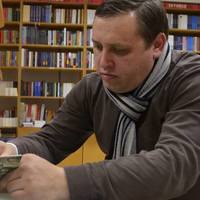

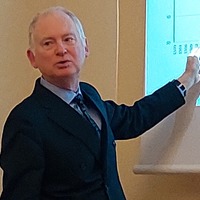

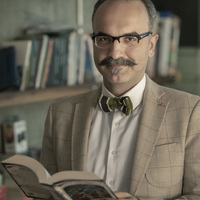
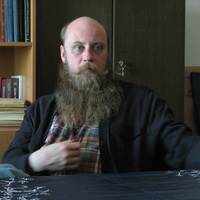
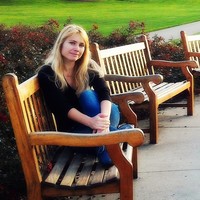
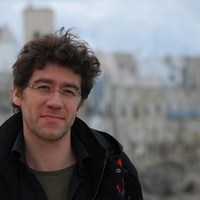


Uploads
Papers by Dorothée Goetze
Abstract
The Peace of Westphalia is extensively described in modern historiography and regarded as a central event in the history of early modern international relations. However, the inherent logic of the preceding peace congress as the first international and multilateral delegated peace congress is much less explored. This research report delineates the main research developments and highlights current approaches as well as desiderata. Thereby the authors show that the lack of research on the peace congress as a diplomatic event results from its position between Historical Peace Research and New Diplomatic History. Originating from court research, New Diplomatic History has so far not paid much attention to the specifics of congress diplomacy. Accordingly, the authors stress the potential that lies in analysing the Westphalian Peace Congress from such a cultural historical perspective for Historical Peace Research, which is the only way allowing us to explore the difficulties of peacemaking in a profound and comprehensive manner.
Abstract
The Peace of Westphalia is extensively described in modern historiography and regarded as a central event in the history of early modern international relations. However, the inherent logic of the preceding peace congress as the first international and multilateral delegated peace congress is much less explored. This research report delineates the main research developments and highlights current approaches as well as desiderata. Thereby the authors show that the lack of research on the peace congress as a diplomatic event results from its position between Historical Peace Research and New Diplomatic History. Originating from court research, New Diplomatic History has so far not paid much attention to the specifics of congress diplomacy. Accordingly, the authors stress the potential that lies in analysing the Westphalian Peace Congress from such a cultural historical perspective for Historical Peace Research, which is the only way allowing us to explore the difficulties of peacemaking in a profound and comprehensive manner.
Wie beeinflusste eine solch große Konferenz die ausrichtende Stadt? Das meint nicht nur Infrastrukturfragen, sondern auch Auswirkungen etwa auf das kulturelle Leben.
Der WFK eignet sich besonders gut als Kontrastfolie, da er vor der Herausforderung stand, hochkomplexe religiös-konfessionelle Konfliktlagen zu entschärfen sowie Auseinandersetzungen um Staatsbildungsprozesse nach Innen und Außen beizulegen – alles Themen und Problemfelder gegenwärtiger Auseinandersetzungen in Afrika, dem Nahen Osten und Südosteuropa. Die Konzentration auf ein historisches Fallbeispiel ist notwendig, um eine ganzheitliche Betrachtung von Friedensprozessen und analytische Schärfe zu gewährleisten, ohne unterschiedliche Ausgangssituationen zu vermischen.
Für das Verständnis von Frieden als Prozess ist es notwendig, einen kulturgeschichtlichen Blickwinkel einzunehmen, der soziale, ökonomische, politische und kulturelle Faktoren integriert. Aus diesem Grunde wird ein interdisziplinärer und personell wie auch thematisch internationaler Ansatz gewählt, der sich bewusst von der traditionellen historischen Forschung zum WFK abgrenzt. Vielmehr sollen bestehende Perspektiven aufgebrochen werden, um zu einer umfassenden Sicht auf Friedenschließen zu gelangen.
1. Nachwuchssektion:
Ein zentrales Instrument zur Weitung der wissenschaftlichen Perspektive ist eine Nachwuchssektion, die bis zu vier Master-Kandidat/innen und Doktorand/innen die Möglichkeit bietet, ihre Forschungsprojekte zum Westfälischen Frieden zu präsentieren. Bewerbungen aller Disziplinen sind willkommen. Die Vorträge sollen maximal 15 Minuten dauern.
2. Posterausstellung:
Parallel zur Konferenz und den Vorträgen bieten die Veranstalterinnen Nachwuchswissenschaftler/innen (Master-Kandidat/innen und Doktorand/innen) die Möglichkeit, ihre Projekte im Rahmen einer Posterausstellung zu präsentieren. Bei Bewilligung müssen die Poster bis spätestens zum 15. Juli 2017 an die Organisatorinnen geschickt werden.
Eine Bewerbung für beide Calls ist möglich. Bitte machen Sie in Ihrer Bewerbung deutlich, wofür Sie sich bewerben.
Bewerbungen (Abstracts max. 350 Wörter) sind bis zum 04.06.2017 an dgoetze@uni-bonn.de oder loetzel@uni-bonn.de zu richten.
Die Veranstalterinnen bemühen sich darum, einen Reisekostenzuschuss für die Teilnehmer/innen einzuwerben.
The conflicts in the Middle East, in the Ukraine, within the EU as well as the difficult rapprochement between the U.S. and Iran illustrate the difficulties of ending (military) conflicts and peacemaking. However, the often tedious struggle for peace is not a modern phenomenon. The complex early modern “state”relations were not only shaped by warfare, but by a constant endeavour for peace. The exploration of early modern peace processes deepens our understanding of conditions and difficulties of peacemaking. Furthermore, it helps to develop suitable diplomatic instruments. Especially the temporal distance allows an unprejudiced and critical perspective which could be productive for today’s conflicts.
The Westphalian peace conference was presented with the challenge to solve highly complex religious conflicts as well as clashing internal and external state building processes – all these problems can be observed in today’s conflicts in Africa, the Middle East and Southeast Europe. The Westphalian Peace Congress cannot solve today’s problems, but it can be used as a template to deepen our understanding of the complexity of peacemaking negotiations.
In order to demonstrate the potentials of examining the Westphalian Peace Congress this conference asks for the political, economic, social and discursive conditions for peace(making) in an interdisciplinary approach to create awareness for the complexity of peace finding processes. For this purpose we bind together the various aspects of peace and thus enable a holistic, international and interdisciplinary approach. This prevents to mix up different starting situations and guarantees a sharp analysis.
1. Young talent panel
A panel for young talents, both Master and Ph.D. students, with up to four presentations is a central instrument for breaking up traditional perspectives on the Westphalian Peace Congress and bringing together well established and upcoming researchers. Applications from all fields within the humanities are welcome. The presentations should not exceed 15 minutes.
2. Poster exhibition
The conference should be accompanied by a poster exhibition that gives Master and Ph.D. students the possibility to show their projects. If the poster is accepted, it should be sent to the organisers by 15th July 2017.
It is possible to apply for both calls. Please indicate in your application.
Applications (abstracts up to 350 words) are expected to be sent to dgoetze@uni-bonn.de or loetzel@uni-bonn.de by 04th of June 2017 at the latest.
The organisers try to receive travel grants for the participants.
Der WFK als erster multilateraler Gesandtenkongress der Neuzeit eignet sich besonders gut als Kontrastfolie, da er vor der Herausforderung stand, hochkomplexe religiös-konfessionelle Konfliktlagen zu entschärfen sowie Auseinandersetzungen um Staatsbildungsprozesse nach Innen und Außen beizulegen – alles Themen und Problemfelder gegenwärtiger Auseinandersetzungen in Afrika, dem Nahen Osten und Südosteuropa. Die Konzentration auf ein historisches Fallbeispiel ist notwendig, um eine ganzheitliche Betrachtung von Friedensprozessen zu gewährleisten. Diese Fokussierung auf ein Untersuchungsobjekt verhindert, unterschiedliche Ausgangssituationen zu vermischen, und sichert analytische Schärfe. Der Tagung geht es nicht darum, den WFK als Ort der Erinnerungskultur zu betonen oder ihn als Schablone auf die heutigen Konflikte zu legen.
Der Westfälische Frieden und die ihm vorausgehenden Verhandlungen gehören unstreitig zu den am dichtesten beschriebenen historischen Ereignissen der modernen Historiographie. Insgesamt löst sich die Forschung bis heute erst allmählich von der traditionellen politikgeschichtlichen Perspektive. Für das Verständnis von Frieden als Prozess ist es jedoch notwendig, einen kulturgeschichtlichen Blickwinkel einzunehmen, der soziale, ökonomische, politische und kulturelle Faktoren integriert. Deshalb wählt die Tagung einen interdisziplinären und personell wie auch thematisch internationalen Ansatz, der sich bewusst von der traditionellen historischen Forschung zum WFK abgrenzt. Vielmehr sollen bestehende Perspektiven aufgebrochen werden, um zu einer umfassenden Sicht auf Friedenschließen zu gelangen.
Dafür werden zunächst die bestehenden, zum Teil stark national geprägten Narrative zum Frieden hinterfragt sowie die ihnen zu Grunde liegenden Quellen und der Umgang mit diesen. In einem zweiten Schritt werden die Rahmenbedingungen, die Friedenschließen ermöglichen bzw. behindern, untersucht, mit anderen Worten es werden prägende Diskurse und diplomatische Praktiken in den Blick genommen. Schließlich geht es um die Funktions- und Wirkungsweise populärwissenschaftlicher Zugänge zum WFK und wie diese helfen, die Öffentlichkeit für die Schwierigkeiten des Friedenschließens zu sensibilisieren. Entsprechend schließt die Tagung mit einer Podiumsdiskussion mit dem Titel „Friedenschließen und kein Ende? Von der Aktualität frühneuzeitlicher Friedensprozesse“, die sich gezielt nicht nur an die Fachwissenschaft, sondern ebenso an eine breitere Öffentlichkeit richtet.
Mittels einer solch umfassenden Betrachtungsweise eines einzigen sehr prägenden historischen Fallbeispiels wird die Prozesshaftigkeit und Komplexität des Friedenschließens herausgestrichen. Ein Aspekt, der bislang in der historischen Friedensforschung und Diplomatiegeschichte nicht ausreichend Beachtung gefunden hat.